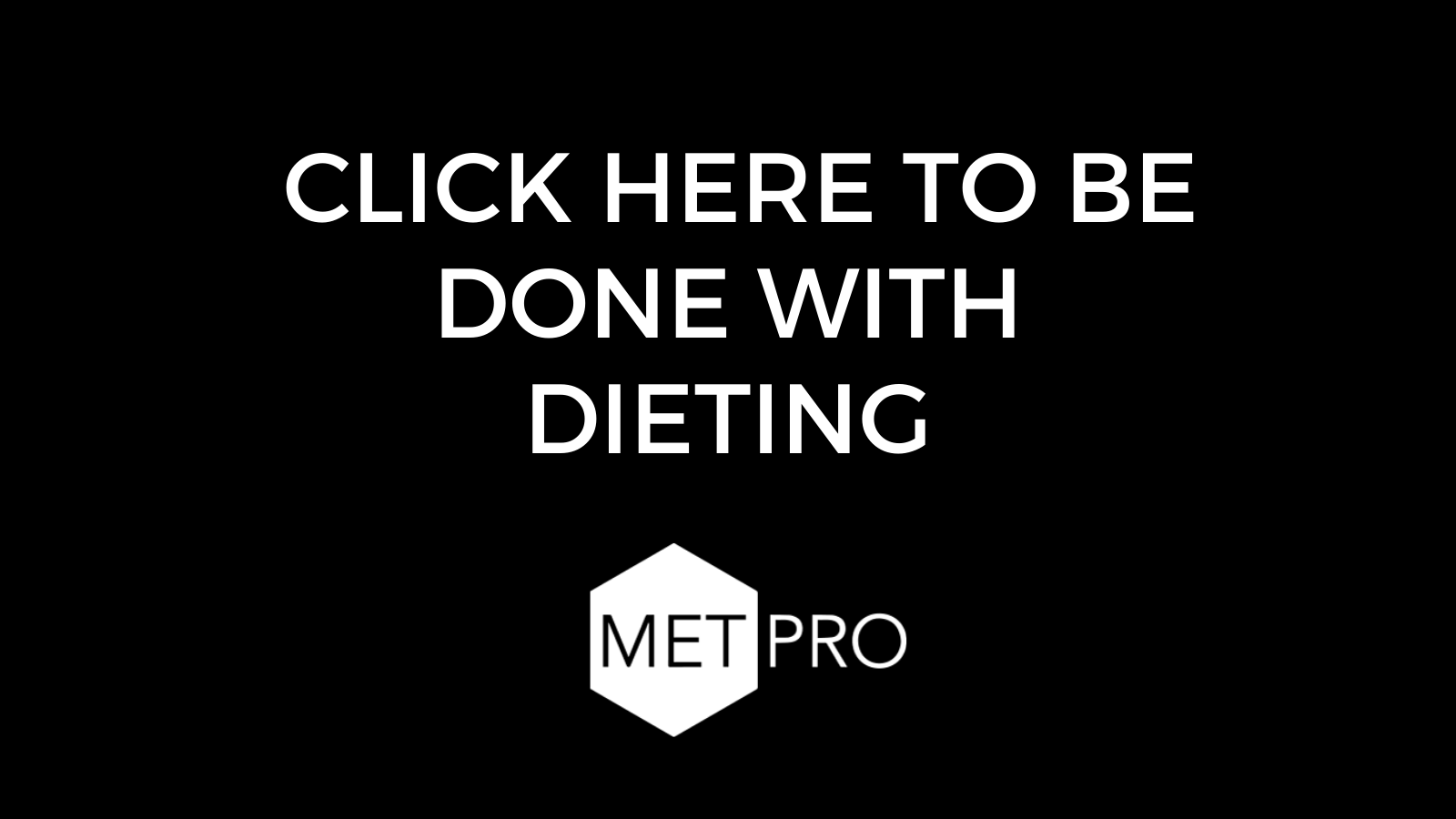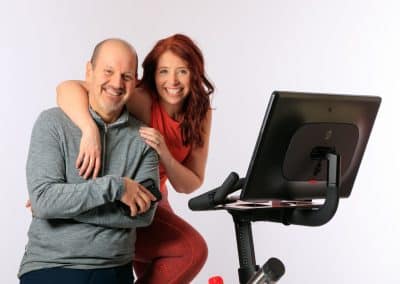I'm joined by MetPro Coach Jessee Davis, and we will be discussing behavior change and how it can play a role in reaching your fitness goals. Jessee, thank you so much for joining me.
Thank you for having me. I’m excited. This is a good topic.
I am super curious to know the answers to some of the questions I have for you. With that, we will dive in. Why do you think it's important to have a conversation about behavior change when we are discussing fitness goals?
When it comes to anything in life that we are trying to do better, looking at those behaviors is a good place to start. When we look at changing an outcome, we want to change a result. We are looking at fitness. We are looking to get faster, stronger, and leaner. That's a change. That's contrast. We want to be something different. Change begins is with action. That's where that behavior change can be pivotal.
As a MetPro Coach, how can you help people change their behavior?
That is the question of the hour. That is what we do as MetPro coaches. We can tell them how to eat right and what to do for exercise. The real mean potatoes of coaching are behavior change. It's creating an environment where they feel their goals are attainable and that they can change the way that they view their lifestyle. That's what we do.
We start small, whether they are doing well. We build on setting goals towards their vision, that person that they want to be. Sometimes they can accomplish one goal at a time. Sometimes people can accomplish two goals at a time. That's dependent on their level of availability and motivation to know how many things they can put on their plate.
When it comes to making your goals happen, regardless of what type of goal it is, does that mean that every goal we are trying to achieve requires some behavior change?
If I had to think about the answer to that, I would have to say, “Yes.” I can't think of an area where that wouldn't be the case. If we want to change the outcome, we have to change the behavior. I'm going to go with a yes.
Sorry for putting you on the spot there.
I have to make a retract. I will let you know.**
When it comes to helping people change their behavior, are there specific methods that you have to help people change?
In the psychology world and the behavior change world, there's a whole world of people that work with behavior change. There are several different methods. As a client, they don't know anything about any of the methods. They know that their coach is asking the right questions. Hopefully, getting the right answers and get them to start thinking about their goals and what they need to accomplish.
The first method I would use or that I'm asking my questions toward is their readiness to change. If I'm going to try to jump in on behavior change and tell them to stop drinking their wine but they are not even ready to stop drinking their wine, that behavior is never going to change. We have to dive first into that readiness and hearing, “Do they say out loud, the good and bad? Are they aware of whatever that habit or behavior is that they are doing that they want to change? Are they even talking about it? Do they know that some of it is good, and some of it's bad?” That's step one.
That comes into their own awareness. Let's use smoking. A lot of people smoke. They know they shouldn't smoke, good versus bad. They have to internalize that and say, “How does that impact me? Why do I care if it's good or bad?” If they say, “That's good and bad.” They never even break that barrier of making that self-aware that they do that behavior. That change is never going to happen because they don't even know that they have that behavior. Understanding are they talking about themselves or are they talking about the world? “Smoking is bad. I can't believe people smoke. I know I do but I can't believe other people do.”
You would think if somebody is signing up for something like MetPro that signals, “I'm ready to make a change of some kind.” I guess that's not always the case, is it?
It's not always the case and it looks different. Maybe I would agree with everybody that signs up to get a coach, wants to be healthier, eat better, and exercise, that intention is there. The intention is they know they can't keep doing what they are doing but they haven't quite got to that next step yet. They don't know what they're going to have to change. If they know they are going to have to change something but they haven't thought about it, maybe that's why we are here.
Some of our clients will come to us. They will figure out what they need to change and don't want to. They love us and say, “You are awesome, Jessee. Thank you and I'm going to stick with these habits.” That's okay because they have complete control. That's what we want to bring that self-awareness to. Know what you are doing and make that decision. Don't judge other people for doing it. I don't care what other people are doing. I care what you are doing. Do you care what you are doing? Having that more internal talk versus an external talk.
Most people that are going to come to us are going to be slightly closer to readiness but there is probably more than one thing they need to change. They probably are thinking, “I will change this and this but I'm not ready to change that and that.” That's usually where the coaching comes in. We start asking questions and we are like, “Where are you at? What are the things that you want to be better in?” They list these things. You can pay attention here. What are the things that they already know or are ready to change? What are the things that they are still contemplating? That readiness isn't there yet. I'm going to start over here and eventually will move in that direction.
You bring up many things that make me have additional questions. I'm going to put you on spot again. When I hear all this, I put myself in this position and whenever I first started MetPro, I felt like, “If somebody told me what to eat, I would be good.” That is true to an extent but it took me a long time to realize that I have issues where I still eat emotionally.
Even though I know I shouldn't and it's bad, there are still days that the emotion wins and I go ahead and do it. My question is, are there other people who when they sign up or go through this process, do you think that people generally know, I need to change behaviors to get where I want to go? Do you think that sometimes people aren't aware and they need to be gently led there?
I think that we get the whole walk of life. We get them from both ends of the spectrum. There will be clients that come in and they think they are doing everything right. They sign up because they want justification that they are doing everything right. In our world, there's always room for progress, change, and to evolve.
If you become with that fixed mindset, behavior change is going to be impossible because you don't see change as beneficial. It is a conversation that again is had right at the beginning because you got to get that buy-in and say, “What we do as coaches is change behavior. Are you ready to do that?” That's not what we say directly but that's what we are doing.
I want to point out that we are not necessarily talking about losing weight. A lot of people might view MetPro as, “It's a weight loss program.” You mentioned earlier all kinds of goals that people could have like increasing their running speed or potentially changing their body composition. There are a million different things it could be. It’s not necessarily losing weight. Sometimes the frank conversations that we get to have as coaches are what help people realize that if you have this goal of changing your body composition, there are these other things you are going to need to do. You may never have even considered it.
There are a lot of things. If somebody can feel emotionally connected to that behavior, change, and willingness of wanting to run faster or lift more, that emotional charge and energy, that's the motivation. That's what's going to keep them going. If they don't feel any emotion inside of themselves towards that behavior that they are doing, that's what we call ambivalent. You know what you do, the pros and cons but you haven't quite made it to the heart yet.
That's what we are looking for. When people are ready to change, they are going to have that emotional connection to that goal. We are going to cut the goals and fail at those goals. We are going to have those bad days where we eat everything in sight. It’s going to be like, “Does this mean I'm never going to be successful?” Of course not. Does that mean that you are going to relapse? Probably, yes. It's the way that we have to be more realistic. If we can be realistic, we can move forward. If we set unrealistic goals, we set them for failure.
As a coach, how can you pinpoint when somebody genuinely has a “behavior” that needs to be changed versus they had a bad moment?
I do like that one because it’s talking back to the relapse. It's like, “Was it one night, a day, a week or a month?” That's where you have to become aware. If it's just 1 day, 1 meal, 1 workout, and 1 blimp on the radar, then it's probably not going to be a big deal. That's why you want to look at trends, consistency, and behaviors over time.
It's not like, “I was perfect now. I should lose weight tomorrow.” We all know that doesn't happen. We would be perfect for a week. Over time, if we are like, “I've noticed that I told myself I wasn't going to have ice cream this week. My goal was I wasn't going to have any ice cream this week. My husband went and bought ice cream, and put it in the refrigerator. I made it all the way until Friday and had a scoop of ice.” Does that mean that goal was not successful? Absolutely not.
I would say, “Let's break it down. Let's give it a percentage. If you had 7 nights and 7 opportunities and had 1 of 7 that you didn't succeed in, then you are way better off than you were 7 out of 7.” That's more of the mindset to have, coach through and be like, “Get back on the wagon.” I'm sure you guys hear that all the time because your coaches at MetPro were on a roster. It's not about a blimp on the radar. It is about the trends and the data that we get. We will throw those one-offs out because they don't matter.
I find people fascinating, myself included that it's like the things that we ask for help with are not always the things we actually need help with. Do you run into that?
It is and that comes back to that readiness. When people are asking for help, it's because they've already done the contemplation in their head and weighed out all the things that they want to change. They are like, “This is going to be the easiest. Let me start here. This is what I'm ready to change.” Whether they are consciously aware that they did that or not, that's what they did. They are coming to you with one thing that they want to change and you are like, “That's not what you need to change.”
What that means is that if they can successfully change that behavior, it's going to build their self-efficacy. It's going to build that self-motivation that's going to say, “If I can do that, I bet I can do something else. What's the next thing I'm ready to accomplish?” Starting where somebody is willing to change and seeing how they do and what their struggles are and moving forward at their own pace and not comparing themselves to everyone around them.
That's a great method in and of itself. It’s working on you versus you, not you versus other people.
It's always a good reminder.
How do you get buy-in from people when you spot a behavior they need help with but haven't seen yet?
To be honest with you, there are many things that we can improve on and change. I'm usually finding somewhere we can meet in the middle. I cannot think of a client whom I've said in my head, “They are way off course. They need to focus on this and not on that.” I do believe it all bleeds together. If they can feel confident in whatever it is that they are willing to change, that's going to help with next time and the next goal.
Take a great example. Somebody wants to lose weight. They love working out. They work out all the time. Their workouts are not the problem. It is the food that they eat. When I get them on the phone, I want to talk about food. I don't want to talk about workouts because that's not the problem. They want to talk about workouts because they love workouts. These are their favorite things in the world.
How do I coach through behavior change in food when their head isn't even around it? What I try to do, if this is the example, I'm going to try to leech the food into his world of fitness. It will be like a subconscious like, “How was your workout? How did it feel? What did you eat before your workout? Would you eat after your workout? How did the fuel feel?”
I'm talking about the fuel for his workout and that happens to be the food that's on the plan. Was it on plan and was not planned? Is he doing what he needs to do or is he not? Being able to set those goals for his food based on his exercise. It's like, “This is what you are doing this week, and this is what your body is feeling. It's important that you do this and this for your nutrition.”
I'm not telling him the background that he has to change his behavior or anything like that. In his head, he's thinking, “I want to do better at my fitness. She's telling me if I eat better, I can do better at my fitness.” In his mind, he might not even be aware his behavior change is food-based. He might be thinking, “It's fitness based.” I would say that's probably how I squeeze in my goals and they still can have their goals.
All of your clients are going to be like, “She's talking about food. How did that happen?” I love that because it's also a form of motivating them intrinsically, which is what you were saying back at the beginning. If they don't feel it emotionally, they are not going to be able to make the behavioral change. You are linking it to something that is motivating to them. That is super smart and something that we can tell ourselves all day long but sometimes is difficult to do.
One of those things where a coach is critical is doing the outside thinking and making us think about things in different ways and pushing us in ways we don't expect because that allows us to try new things without feeling as vulnerable or as like, “I have to link food to my workouts so I can make this change.” That becomes a struggle in my head when I say that I'm going to do that for myself. When I hear you say, “This is what we should do,” I'm like, “That's a great idea.”
That's why it's always better to have a team.
Is there anything else we've missed that people would be helped by knowing about behavioral change?
A few tips that you can start thinking about, “Where am I at and where do I even start?” We can't think about behavior change until we have created a vision for ourselves. I'm sure that many of you out there have heard of the vision boards or the dream boards. You go and cut things out of papers or magazines, all that old-school arts, and crafts.
You put a dream board up of all the things that you want your life to look like. What do you dream about? The more we can think about it, the more it will come true. These are some things that you can think about that will help you create your vision. I was going to be a side note if we want to do another podcast on visions, that will be a good one.
Think about your best experiences in life when you are creating a vision and you think about what you want your future to look like. What has brought those positive experiences in the past? What brings you joy? What are your core values? What are things that are important to you? Those are important. A core value AKA, “I will never sacrifice my date night with my husband. I will always have a bottle of wine with him on Sunday nights. I will always have girl’s night.” Those are core values in a sense. We are not willing to sacrifice our friendships. “Friendships mean a lot to me. This is how I show my friendship.”
Being realistic and understanding your values because you can't change something that's not valuable to you. If a coach tries to tell you, it's supposed to be valuable to you, it's not going to be. You are on your own. Create those core values that are important to you. What brings you energy? What makes you feel alive inside?
Start thinking and writing. Keep a journal and your vision doesn't have to come to you overnight. It doesn't have to come to you in one sitting. It might take a month or a year to create a vision because you are writing things down. You are like, “This made me feel alive. This hurt me. I didn't like this feeling.” You are becoming more aware of experiences. It can help you create that vision. Learning about your wellness. Go to the doctors and get lab work. What's your blood pressure? Get on the scale. Figure out these data points to know where you are sitting because if you don't know where you are at, how do you know where you want to be?
The pros and cons, think about all the good things that are going to happen when you create this new lifestyle and think about the negative things that are going to happen. You might lose friends. You might not be able to go out as much. You might save more money. If you start thinking about all these different things that are going to happen when one behavior changes, it's a spiral or domino effect.
This is my favorite part and what my kids argue about. Every day I talk to them. In sports, we talk a lot about visualization. My kids do not believe that if you visualize the basket going in or the ball going in, it will make it better because they are kids and I'm working on it. As adults, I'm telling you all, visualization is huge. It's a key.
The easiest thing you can do is when you go to bed at night, which is your homework for your readers, close your eyes and instead of being stressed about whatever you got going on the next day or whatever you naturally think about when you go to bed. If you have the TV, turn it off, close your eyes, and think about that vision.
Think about that life. Think about what you look like. Think about what your kids are doing if you have them and what your partner is doing if you have one. Think about your life in a vision that you have been working hard for. If you go to bed every night, working on that vision, it’s probably going to come true sooner than later because you are seeing it every night before you go to bed. Don't underestimate imagery, visionary, and creation in the mind because the mind is where it starts.
I’m pumped up. I need to get some goals so I can go crush them. Thank you, Jessee. I appreciate your time. That's all for this episode. You can find all of the MetPro Method episodes, anywhere or you can also go to MetPro.co/podcast. Please be sure to follow the show and rate and review because that lets other people know what to expect. You can also learn more about MetPro at MetPro.co. I will be back next time. Until then, remember consistency is key.






